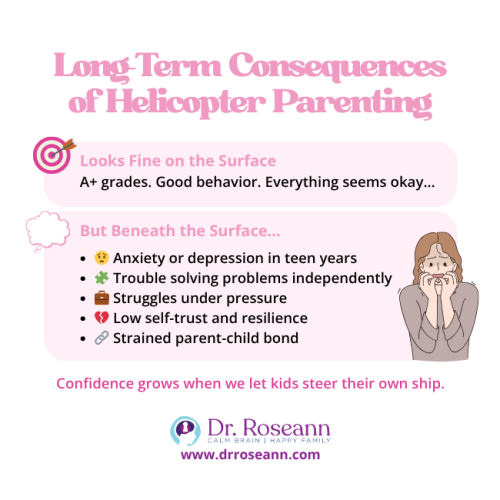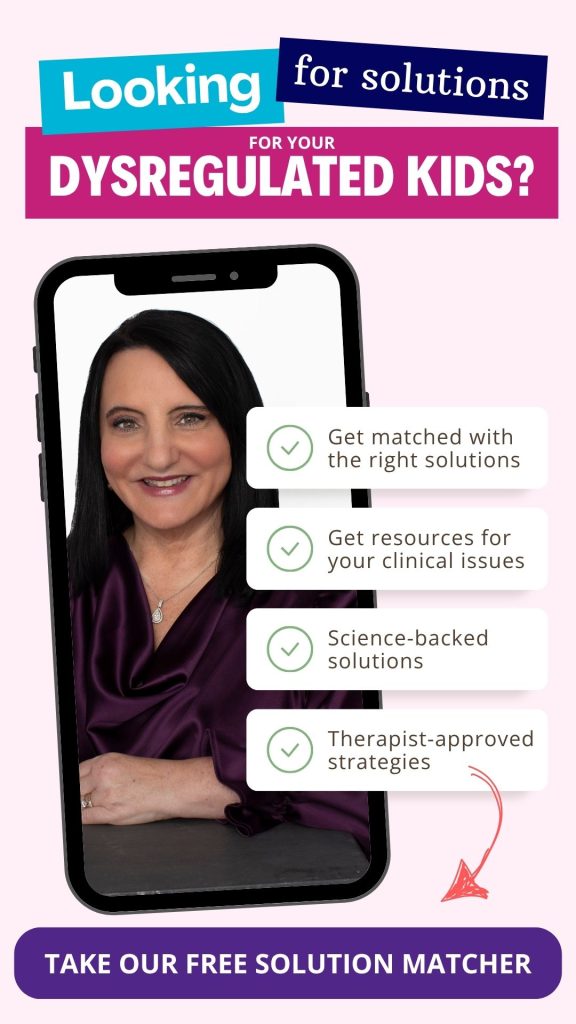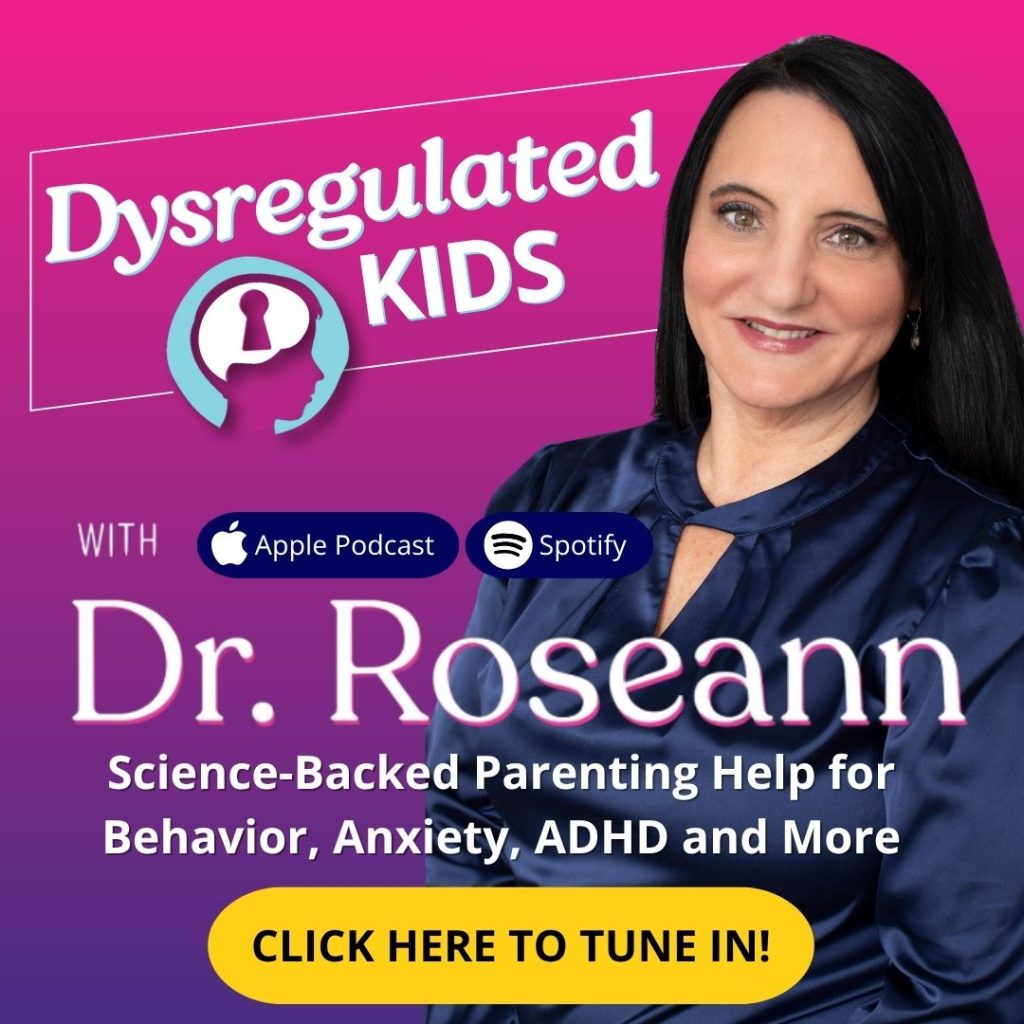Estimated reading time: 7 minutes
If your child’s confidence or motivation seems to be shrinking even though you’re trying your best to protect them—you’re not alone.
This guide unpacks the hidden effects of helicopter parenting, what’s really happening in your child’s brain, and how to shift toward calm, confident independence—without guilt or fear.
What Is Helicopter Parenting and Why Do Parents Do It?
Helicopter parenting means hovering over your child’s every move—managing their homework, friendships, and feelings so closely that they rarely get to make mistakes on their own.
Most parents don’t start out trying to control. They’re trying to keep their child safe, from failure, hurt feelings, or bad decisions. But beneath that constant involvement often lies anxiety and fear—our own nervous system’s way of trying to protect what we love most.
Why it happens:
- Fear of failure or judgment
- Academic and social pressure
- Past trauma or perfectionism
- Misunderstanding of what true support looks like
When we over-manage, we unintentionally teach our child’s brain that the world isn’t safe unless we’re in charge. Over time, that can wire their nervous system for anxiety instead of resilience.
Research confirms this: overly controlling or “helicopter” parenting can limit autonomy and contribute to poorer emotional outcomes in young people (Miller, Rainbolt & Tallents, 2024).
What Are the Psychological and Emotional Effects of Helicopter Parenting?

Helicopter parenting reaches far beyond behavior—it shapes a child’s nervous system, confidence, and inner sense of safety (Hayes & Turner, 2021). Sometimes it begins from love yet grows roots in fear.
When a child lives under constant watch, their brain receives a confusing message: “I’m loved, yet maybe not trusted enough to handle life alone.” Over time that idea quietly rewires the nervous system for worry instead of resilience.
You might notice signs that whisper rather than shout.
- Anxiety and perfectionism: their brain begins linking safety with parental approval, almost like a security blanket made of pressure.
- Low self-confidence: they start depending on adults for choices and calm, forgetting their own internal compass.
- Avoidance of challenges: mistakes feel dangerous since they’ve never been allowed safe failure.
- Emotional dysregulation: control blocks the natural practice of stress recovery, leaving their inner system untested.
When kids never face small storms, their nervous system stays brittle, like a sapling shielded from every gust. It bends beautifully in calm air but snaps when the wind arrives.
That’s why our job isn’t removing every challenge—it’s teaching the brain that discomfort can be safe, that it’s a bridge toward growth. Sometimes calm doesn’t mean quiet; it means steady within the chaos.
Remember my mantra:
“Calm the Brain First, Everything Follows.” When we create that safety, confidence blooms. Mistakes become lessons, not threats. And that’s how a child learns to ride life’s waves instead of fearing them.
How Does Helicopter Parenting Affect a Child’s Nervous System?
Every act of overprotection quietly tells your child’s brain, “You can’t handle this.”
Over time, that message fuels dysregulation—a nervous system stuck in fight, flight, or freeze.
When kids never face small, safe challenges:
- Their stress response stays overactive.
- Their reasoning and regulation centers lag behind.
- They depend on others for calm instead of finding it within.
That’s why helicopter-parented kids often seem anxious or reactive—even when life looks fine on the outside.
Parent Story:
Grace, mom of a 9-year-old with anxiety, noticed she was micromanaging homework and friendships. When she stepped back and let her daughter make small decisions, something shifted—fewer stomachaches, more laughter. Her calm became her daughter’s anchor.
Because when we regulate ourselves first, our children borrow steadiness from our calm—not our control.
What Are the Long-Term Consequences of Helicopter Parenting?

How Can Parents Stop Helicopter Parenting Without Feeling Guilty?
Change begins with compassion—for yourself.
If you recognize helicopter habits, take a deep breath. You’re not failing. You’ve simply been operating from fear, not regulation.
Here’s how to shift:
- Pause before rescuing. Ask: “Is this unsafe, or just uncomfortable?”
- Use co-regulation. Model calm when your child struggles.
- Let them experience natural consequences. Growth comes from reflection, not rescue.
- Celebrate effort, not perfection. Reinforce courage over control.
- Practice Regulation First Parenting™.
- Regulate: Calm your own nervous system first.
- Connect: Listen without fixing.
- Correct: Guide after calm is restored.
What’s the Link Between Helicopter Parenting and Anxiety?
Helicopter parenting and anxiety are deeply intertwined—for both parent and child.
When a parent’s fear drives behavior, the child’s nervous system mirrors that tension. The result? Mutual dysregulation.
| For parents | For children |
| Chronic worry keeps cortisol high and the body stuck in “alert mode.” | They absorb that anxiety, learning that the world feels unsafe and unpredictable without constant control. |
To begin breaking this cycle:
- Build predictable routines that help everyone’s brain feel safe.
- Practice daily calming tools—gentle breathing, movement, or CALM PEMF™ to settle the nervous system.
- Remind yourself: Your calm is your child’s calm.
What’s the Difference Between Supportive and Helicopter Parenting?
| Supportive Parenting | Helicopter Parenting |
| Encourages independence | Prevents mistakes |
| Offers guidance, not control | Solves problems for the child |
| Models calm and confidence | Models anxiety and urgency |
| Sets boundaries with warmth | Sets limits through fear |
| Focuses on regulation | Focuses on perfection |
How Can Parents Foster Independence and Resilience Instead?
- Start small. Let your child pour their own juice, solve a peer conflict, or manage a small budget.
- Use curiosity questions: “What do you think would help here?”
- Model emotional regulation. Kids learn self-trust when they see calm under pressure.
- Encourage problem-solving. Offer support only when asked.
- Reflect on progress. Celebrate mistakes as learning wins.
Parent Story:
Marcus, dad to a 13-year-old with ADHD, realized his constant reminders were stressing them both. So he backed off—no more hourly check-ins, just a weekly chat.
Within a month, his son started turning in assignments on time. Marcus slept better too. Turns out, when we loosen our grip, kids rise higher.
Let go a little, and watch your child step up a lot. That’s how confidence blooms—through calm leadership, not control.
What Should I Do If I’ve Been Helicopter Parenting for Years?
It’s never too late to change your parenting pattern. The brain is neuroplastic—which means both yours and your child’s can rewire toward calm and trust.
Practical reset steps:
- Acknowledge the old pattern without shame.
- Explain to your child that you’re learning together.
- Slowly hand over choices and responsibilities.
- Seek professional support if anxiety or dysregulation run deep—programs like BrainBehaviorReset™ can help.
Remember: The goal isn’t to stop caring—it’s to guide from calm instead of control.
Parent Action Steps
FAQs
Is helicopter parenting bad for kids?
Not always—but too much control stifles resilience. Kids grow stronger when they’re trusted to try, fail, and recover.
How do I know if I’m being a helicopter parent?
If you often prevent mistakes or rush to fix problems, you may be hovering. Try guiding instead of rescuing.
Can helicopter parenting cause anxiety?
Yes. Constant protection tells a child’s brain the world isn’t safe without you, increasing anxiety and self-doubt.
What’s the best age to start giving kids independence?
Start small and early. Offer simple choices and expand freedom as your child shows readiness and responsibility.
How can I calm my own anxiety so I don’t hover?
Breathe deeply, ground your body, and focus on co-regulation. When you stay calm, your child’s nervous system learns safety too.
Citations
Hayes, K. N., & Turner, L. A. (2021). The relation of helicopter parenting to maladaptive perfectionism in emerging adults. Journal of Family Issues, 42(12), 2986–3000. https://doi.org/10.1177/0192513X21993194
Jiao, J., & Segrin, C. (2023). Moderating the Association Between Overparenting and Mental Health: Open Family Communication and Emerging Adult Children’s Trait Autonomy. Journal of child and family studies, 32(3), 652–662. https://doi.org/10.1007/s10826-022-02528-2
Miller, R. W., Rainbolt, C. L., & Tallents, S. (2024). Hovering Is Not Helping: Relationships among Helicopter Parenting, Attachment, Academic Outcomes, and Mental Health in College Students. Youth, 4(1), 260-271. https://doi.org/10.3390/youth4010018
Dr. Roseann is a mental health expert in Neurodivergence who frequently is in the media:
- Very Well Mind What Is Asperger Syndrome?
- Parents Are Your Kid’s Meltdowns a Sign of Rejection Sensitive Dysphoria?
- Different Thinking Different Learning How Low Demand Parenting Can Reduce Stress and Support Neurodivergent Youth with Dr. Roseann Capanna-Hodge
- Sparking Wholeness (Audio) Parenting Anxious Kids
- Coronavirus with Saul Podcast Parenting when Sheltering in Place
Always remember… “Calm Brain, Happy Family™”
Disclaimer: This article is not intended to give health advice, and it is recommended to consult with a physician before beginning any new wellness regimen. The effectiveness of diagnosis and treatment varies by patient and condition. Dr. Roseann Capanna-Hodge, LLC, does not guarantee specific results.
Are you looking for SOLUTIONS for your struggling child or teen?
Dr. Roseann and her team are all about science-backed solutions, so you are in the right place!











